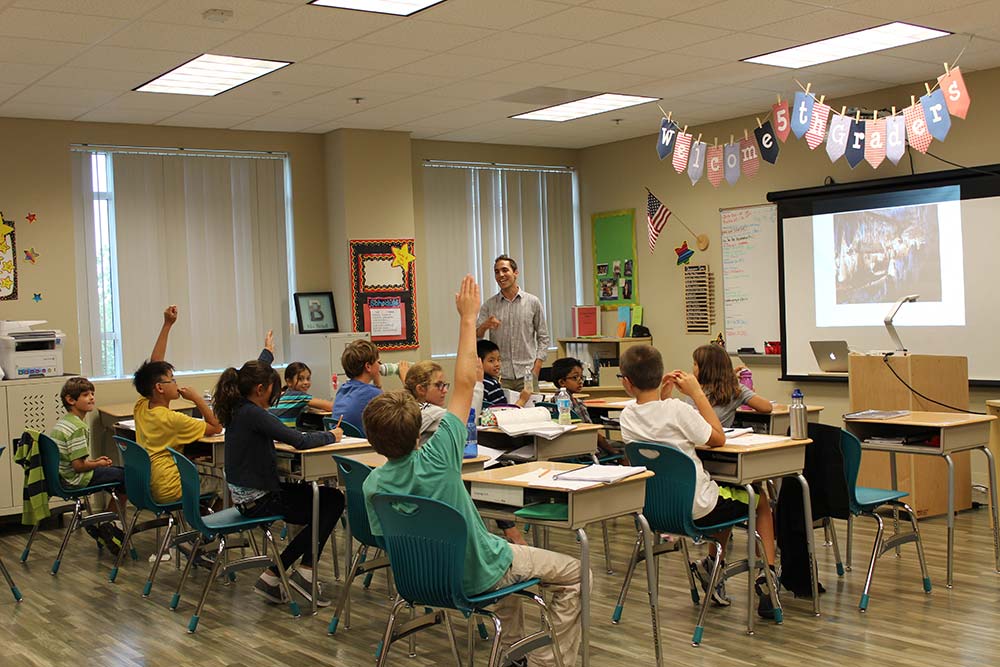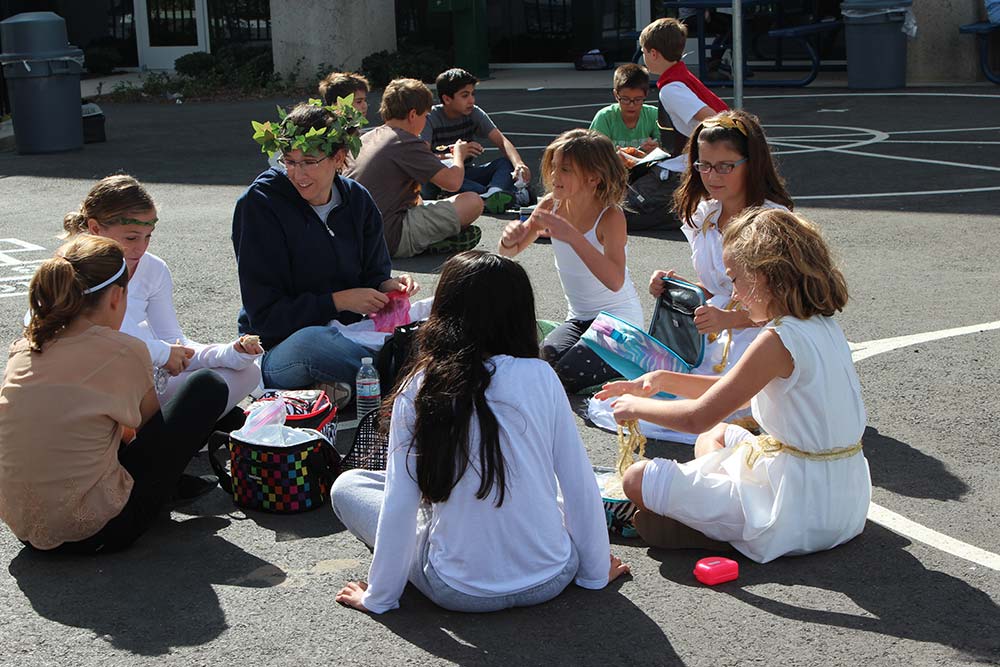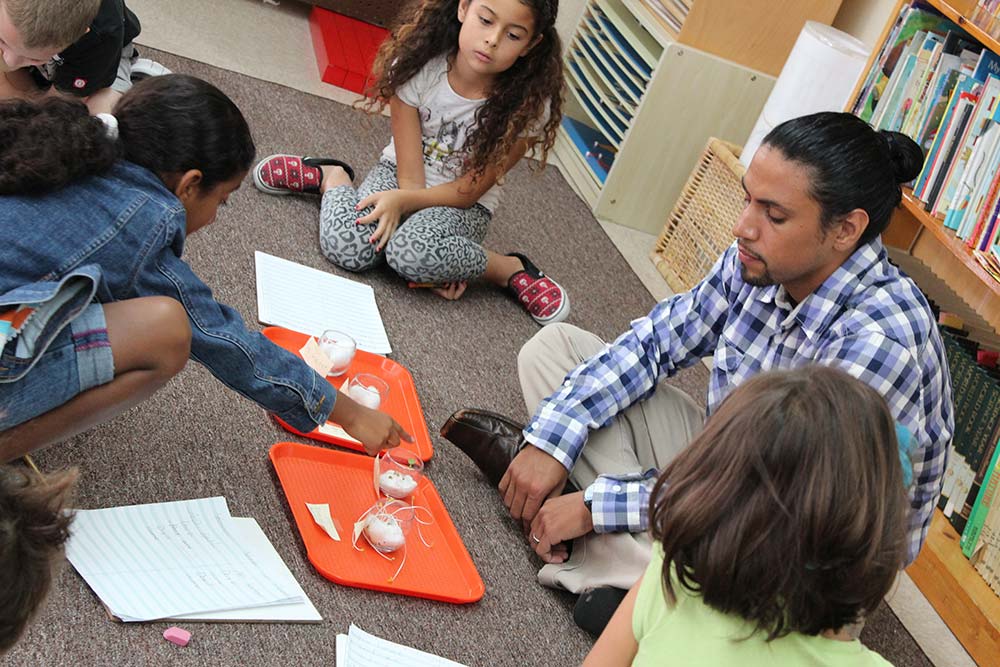The Success of Sixteen
If you’re like many parents researching alternatives to public schools, class size is probably high on your mind. With recent budget cuts, many elementary classrooms even in good school districts are now approaching or exceeding 30 students: Elementary schools in Irvine and Huntington Beach average around 25-30 students for 1st grade, and around 30-35 students for 5th grade. (To find out the average class size for your elementary school in Irvine, click here for a school list, select your school, and open the “School Accountability Report” on the school’s page. For Huntington Beach, click here for links to the accountability reports for Huntington Beach Unified and click here for the reports for Ocean View Unified.)
Everyone knows that small class sizes are better. The question is, how small?
While many studies of class size reduction show a benefit for smaller classes, the greatest benefit is only available with really small classes. Writes the Center for Public Education, in a summary of 19 studies:
A class size of no more than 18 students per teacher is required to produce the greatest benefits.
Center for Public Education
Public schools in both Irvine and Huntington Beach clearly exceed this recommendation – in some cases by a factor of two!
In contrast, at LePort, we limit our 4th – 8th grade class size to 16 students, and maintain at most a 1:14 ratio in our Montessori lower elementary program. Not only that, in addition to a homeroom teacher, who usually teaches literature and language arts for each class, we also have numerous subject matter experts, which means that we have one teacher for every eight students in the upper grades. We are convinced that these really small class sizes are essential to help children acquire Knowledge for Life, and not just memorized jargon to be repeated successfully on standardized tests.
Here are four ways in which our “Magic of Sixteen” works to help your child thrive at LePort:
- In-depth, challenging academics, instead of mechanical test prep. At LePort, we want students to acquire Knowledge for Life, which means we want them to actually understand what they learn, grasp the relevance of their learning to their personal lives, and retain what they learn, so they can apply it, not just in school, but also in life. Our small class size is essential in achieving this goal. No matter how good a teacher, with 30 children in a class she’ll be forced to rely on multiple-choice type exams!
As an example of the type of challenging, thought-provoking questions our students are asked to answer, read this: “What was the Renaissance, and why do you think it began in Italy (rather than, say, England or Norway)? Explain using the facts you’ve learned in history class.” How would you answer this question? Not sure? Click here, and read the answer one of our students gave! For more impressive academics, click here to see a wide range of student work samples from grades 1-3 and from grades 4-8. This type of question would be hard to ask if you had to grade 30 or more papers!
- The ability to foster a growth mindset. Research by Carol Dweck and others has shown that people who view their abilities as malleable, who focus on getting better, who have a growth mindset, live happier lives and are more successful than those who focus on demonstrating how good or smart they are, who have a habitual performance mindset. At LePort, we take this research seriously: we give students un-graded pre-tests, so they can see which areas they need to work on, and get better by putting in hard work. We focus not on a student’s performance against “grade level”, but always challenge each child to improve against himself—for example, by charting their own math facts speeds over time. We can do this, because at LePort, we have the luxury of time. Take one example: our 8th grade homeroom/literature & language arts teacher has just one class of 16 students. This makes it possible for him to provide the type of detailed feedback you can see here in this mystery story assignment. We’re able to help our students progress at their own pace and level because we have the time to give substantive, specific feedback on essay after essay, math assignment after math assignment, history paragraph response after paragraph response. As one parent put it succinctly:
I am an attorney, and I really appreciate LePort’s writing program. It’s really unique: because they are a small school and have very high standards, the kids will do many re-writes of their assignments. And that’s how they actually learn—by doing draft after draft, correcting their mistakes under the guidance of their teachers, and learning to become better writers in the process. Many schools just can’t do that—and what does a child learn, when he writes something once, then gets a grade and that’s it?!
Susan F., LePort parent
- Adding a personal touch and truly individualizing instruction. No teacher, no matter how dedicated, can truly get to know 30 or 35 students well enough to tailor his instructional approach to an individual child. As a result of large class sizes, and the never-ending focus on standardized tests, many public school teachers sadly categorize children into performance-based groups: The “greens” are those children who will pass the mandated tests, no matter what the teacher does. The “reds” are those that will flunk it, even if the teacher spends a lot of effort on them. The “yellows” are those on the bubble—the children whose test performance the teacher can influence, the ones he can move up to the magical level of “proficient” on the all-important year-end test. These “yellows” are the students he’ll spend most of his time on in class, if he wants to improve his own rating on the standardized, “value-added” assessments of teachers now becoming ever more common in public schools.
At LePort, we think this is a horrible state, but unavoidable given large class sizes and high-stakes testing in public schools. Luckily, at our private school with only 16 children in a class, and without the yoke of mandated teaching-to-the-test, we are able to do things differently. A LePort teacher can really get to know each individual child, and tailor his instruction to each unique, valuable human being in front of him.
Want to see what this means in practice? Here’s just a short excerpt from an email a teacher recently sent to a parent, highlighting the level of observation and thought our teachers put into their relationship with each child:
I wanted to point out a few thoughts I had regarding Maria’s* experience yesterday, and my high hopes for her in the future. She is excellent at following directions, but sometimes struggles with articulating her thoughts. Nothing that she would have written down would have been incorrect, yet I could tell that she felt very uncomfortable with the vast freedom of the assignment. I intend to help her develop this creativity, as I’ve seen glimpses of it in the past. Besides the ability to write an interesting story, the ability to form an opinion about something is a skill that will benefit her in future classrooms, jobs, and social situations. I believe it is a life skill that will allow Maria to become a strong individual, which is why this is so important.
Parent
(Interested in a broader context? Click here to read the whole email, and think about what it would mean to you to know that your child’s teacher observes her in such detail, carefully tailors her instruction to her needs, and takes the time to write you a two-page email giving you a glimpse into your child’s struggles and triumphs in the classroom!)
- Focusing on the whole child, not just academics. At LePort, we want our students to not just be “college and career ready” (an education euphemism for doing well on standardized tests). As our mission statement puts it, we aspire to “help our students acquire the essential knowledge, thinking skills, and strength of character required to flourish as joyous children today, and as successful adults tomorrow.” Personal development is a key component of our instructional approach at LePort, and a 16 student maximum class size is essential in this whole-child approach. Our teachers have plenty of time to interact with their students, not just in the classroom, but also during lunch, recess and on our many field trips. Teachers are able to bond with students. They can provide the guidance children need to develop the strength of character and life skills they need to flourish and to successfully pursue their own path in life.
Here’s an excerpt from another email a teacher sent to parents; it highlights both the teacher’s insight into this student, and his personal appreciation for him as a unique, valuable person:
Aside from academics, I just wanted to share with you that I have never seen Sam upset or angry; he’s rarely shows any other emotion than being extremely happy. He is a true pleasure to not only have in class but also out on the dodge ball court at recess and lunch or even in the halls of school. He always asks me how my day is going, and his compassion seems so unique to me. LePort Teacher
Staffing our school with the many excellent teachers it takes to maintain the successful sixteen, and to achieve an effective 1:10 ratio, is not cheap. In fact, the investment we make in small class sizes and top-notch teachers is the main reason behind our tuition levels. Why do we do this? Because we know that nothing, nothing is as important as the close relationships your child will form during the key elementary and middle school years, with a teacher who is a role model, whom he respects, who can get to know him, challenge him, motivate him to do his best.
We think it’s worth it – and so does this parent, whose child had been attending LePort for a mere two months when she wrote this:
Hi Ms. K.,
On Thursday evening when I picked up Michael at the sitter after the LePort presentation, he INSISTED that I type up a story that he had written. He was SO JAZZED about showing you that typed up story I thought…..who is this kid? I have NEVER, and I mean NEVER known my son to EVER be excited about writing. In fact, as I’ve stated to you previously, creative writing was always his weakest point. To see him like this was AMAZING and even though it was past bedtime I agreed to type it up for him. He was telling me how he loves your accents and that you can make your voice exactly like Miss Grangers of Harry Potter. He speaks so happily about your language arts class. Whatever you are doing – THANKS THANKS THANKS.
WHO IS THIS KID ????
Warm regards,
(A very happy parent)LePort Parent
This is what the Magic of Sixteen at LePort makes possible—not just for Michael, but also for your child.
*Children’s and teachers’ names have been changed, to protect the children’s privacy.
















